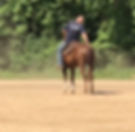REST, A Key Ingredient In Training Horses
- CH Wilson
- Nov 3, 2017
- 2 min read
Updated: Apr 4, 2020

I made this post on social media during the summer, but wanted to share it on the blog to reiterate daily training aspects that can get misplaced when we are looking too far ahead to a desired outcome. Horses are individual beings. Because of that, though they are not human, they do fully function and make decisions based on their own well-being, which is sometimes not along our same ideas and goals. Learning to work with the horse and develop a relationship is the key to being successful in the partnership and accomplish those desired outcomes.
This mare (pictured) has a history, or a story. She was started by another trainer, which has its pros and cons. Every trainer has their own interpretation of what they want as an end result. This mare was not on the right track. She is 4 now, and I've been working with her for most of a year, and we've made a lot of progress. She's a good loper and lead changer, circles nice, spins good, and is still improving. What we've struggled with the most, is the with the stop. It's been a roller coaster and frustrating for both her and me. I know that this mare has the ability to stop. I've been able to get her to do it before, but it seemed that anytime I got her to make a good effort she was done. Then for weeks we would just be fumbling around trying to find it, again. We couldn't get any consistency.
A few months back I realized she wasn't liking her job. It's my responsibility to make sure that she learns to like it. The stupid thing is, it's really easy. I've been doing this for about 20 years or so, and have ridden a lot of horses, both good and bad. Let me say this, once you've ridden enough not-so-good horses, the good ones are easy. But, if you skip steps, they don't actually "train themselves". From experience, as well as instruction, I know how to get a horse to learn to like to stop, but I skipped a step expecting her to fill in the blanks.
We spent a lot of time getting the mechanics of reining - face, neck, shoulder, rib cage, hip, balance, impulsion, lift, top line, break or "hinge" in the back - all the parts. Here's the piece that was missing - REST. I heard a great horseman say a long time ago, "Sometimes the hardest thing to do is reach down and pet your horse." I began to expect less from her and reward her with rest and/or a pat on the hip; sometimes for almost no effort at all. Just sit. In a few rides I noticed some changes and some optimism from her. Soon, more effort and then more effort. Now, a good session of fencing is getting normal. She will still make mistakes, but we're getting there. It's a huge sense of accomplishment, hopefully for her, as much as it is for me. I've started asking my students "when is your horse learning?" The answer from most of them is, or soon will be, "when they are standing still!"

_edited.png)